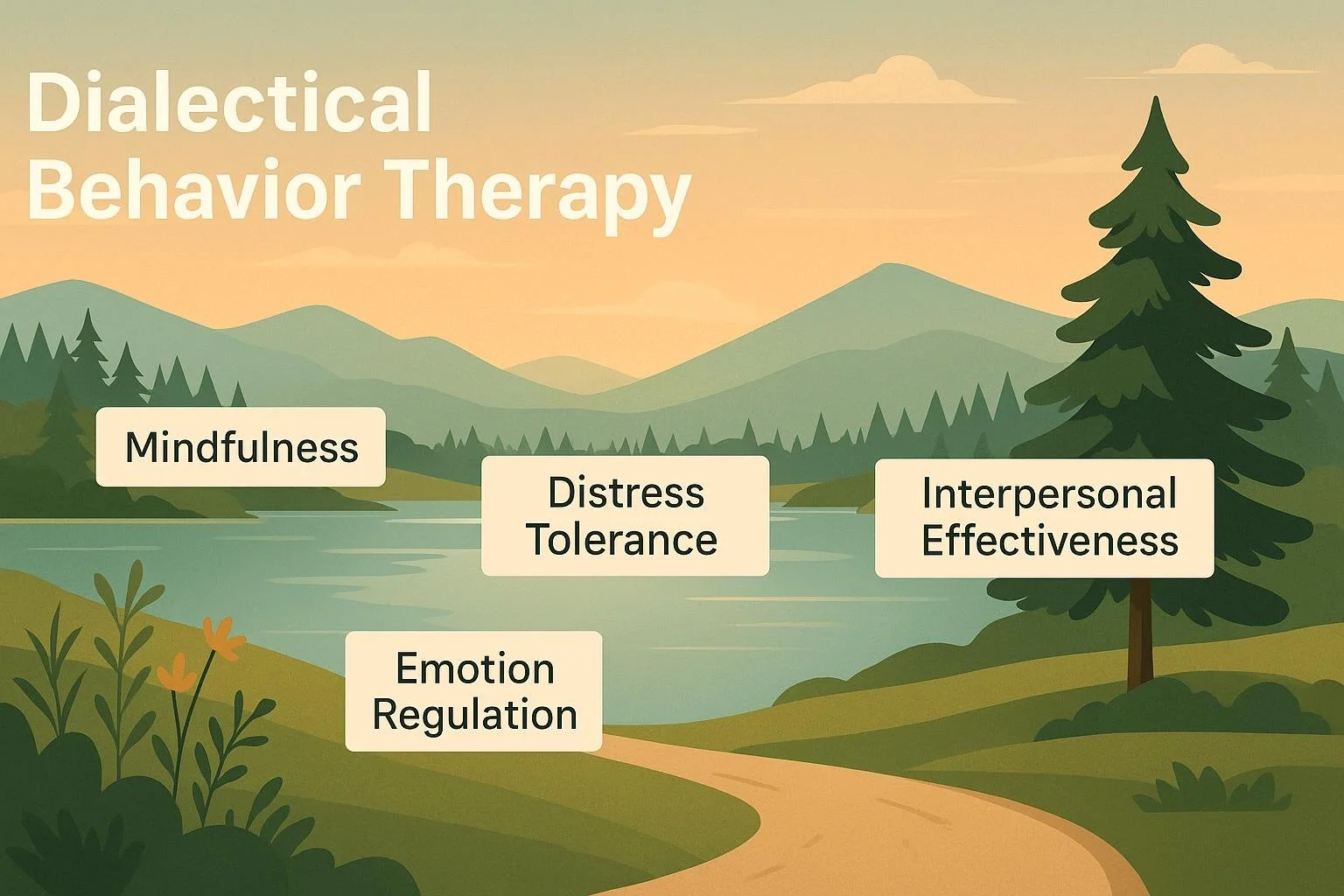Finding Balance with Dialectical Behavior Therapy (DBT)
When emotions feel overwhelming, relationships become strained, or life feels unmanageable, many people search for relief from the anxiety and depression that follows. One evidence-based approach that has helped countless people find stability and hope is Dialectical Behavior Therapy (DBT).
A Brief History of DBT
DBT was developed in the late 1980s by psychologist Marsha Linehan, Ph.D. Originally designed to treat individuals struggling with borderline personality disorder (BPD) and chronic suicidal thoughts, DBT has grown into one of the most respected and widely used therapies for emotional and behavioral challenges. Today, it is used to help people manage anxiety, depression, relationship difficulties, trauma, and intense emotional experiences.
The foundation of DBT is the balance between acceptance and change—learning to validate and accept yourself while also developing the tools needed to move toward growth, healing, and lasting change.
Core Areas of DBT Skills
1. Mindfulness Skills: Finding Freedom from Suffering
Mindfulness is the foundation of all DBT skills. In DBT skills groups, participants learn mindfulness skills that provide practical ways to slow down, observe thoughts and feelings without judgment, and focus on the present moment.
Mindfulness offers:
A method of grounding to help reduce negative assumptions
Anxiety relief by creating space between emotions and reactions
A path toward freedom from suffering, by developing a healthier relationship with pain and stress
A toolkit for living more fully in the present, rather than being caught in past regrets or future worries.
2. Distress Tolerance: Coping Without Self-Destructive Behaviors
When emotions are intense, many people turn to harmful coping strategies. DBT’s distress tolerance skills provide healthier ways to survive crises and move through emotional storms without making things worse.
This area focuses on:
Building freedom from destructive behaviors, such as impulsive decisions, substance use, or self-sabotage
Providing alternatives to suicidal thoughts, feelings, and actions
Reducing reliance on self-harm by replacing it with healthier coping strategies
Offering real tools for depression relief, especially during moments of hopelessness or emotional pain
By practicing distress tolerance, clients learn to ride out painful emotions and crises with resilience, rather than collapsing into harmful cycles.
3. Emotion Regulation: How to Control Emotions and Reduce Stress
Many clients come to DBT feeling overwhelmed by their emotions. The emotion regulation skills teach practical methods for understanding emotions, reducing vulnerability, and creating balance.
These skills include:
Learning techniques for managing anger in healthier ways
Building strategies for how to control emotions before they spiral out of control
Understanding how stress and cortisol affect the body, and developing tools to keep stress levels manageable
Developing emotional balance that reduces the intensity of depression and anxiety
With emotion regulation, clients become less controlled by their emotions and more able to live in alignment with their values.
4. Interpersonal Effectiveness: Building Healthier Relationships
Even when emotions are under control, many people struggle in their relationships. DBT’s interpersonal effectiveness skills provide practical strategies for improving communication and strengthening connections.
This area teaches:
Developing stronger interpersonal abilities to communicate clearly and effectively
Learning skills often covered in relationship counseling, such as setting boundaries and asking for needs to be met
Addressing patterns like anxious attachment style, which can keep people stuck in unhealthy dynamics
Offering practical relationship advice for navigating conflict, improving self-respect, and deepening connections with others
With these tools, clients not only improve their relationships but also learn to honor themselves while maintaining healthier bonds with others.
Why DBT Groups Work
While individual therapy is incredibly valuable, DBT skills are often most effective when learned in a group setting. A DBT group provides accountability, encouragement, and the opportunity to practice skills with others who truly understand the challenges of managing intense emotions.
Clients often share that the group experience gives them a sense of connection and community—a reminder that they’re not alone in their struggles.
DBT Groups in Maryland and Delaware
If you are looking for a DBT group in Maryland or Delaware, our practice offers structured DBT Skills Groups designed to help clients put these tools into practice. Whether you’re seeking anxiety help, depression help, support for borderline personality disorder, or simply a way to build mindfulness and freedom from suffering, our groups provide a safe and supportive space to grow.
Sessions cover mindfulness, distress tolerance, emotion regulation, and interpersonal effectiveness, spending 4-6 weeks in each module
Facilitated by experienced therapists Alec Peer, LCSW-C
Most commercial insurance plans accepted, making groups accessible and affordable.
Take the First Step Toward Change
If you’ve been searching for DBT in Maryland or DBT in Delaware, our DBT Skills Groups may be the resource you’ve been looking for. With a blend of mindfulness skills, distress tolerance, emotion regulation, and interpersonal effectiveness, DBT offers a proven path toward healing, balance, and connection.
📍 Now enrolling DBT Groups in Maryland and Delaware.

